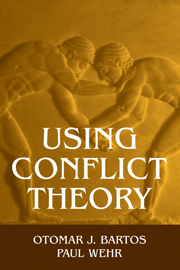Book contents
- Frontmatter
- Contents
- List of Figures and Tables
- Acknowledgments
- 1 Introduction
- 2 Understanding Conflict
- 3 Development of Incompatible Goals
- 4 Application to the Civil Rights Struggle
- 5 Emergence of Overt Conflicts
- 6 Application to a University Conflict
- 7 Escalation and Deescalation
- 8 Application to Conflict in Bosnia
- 9 Making Conflict Work Economically
- 10 Understanding and Managing Conflicts
- Appendix: Prelude to the Dissolution of Yugoslavia
- Notes
- References
- Index
9 - Making Conflict Work Economically
Published online by Cambridge University Press: 05 June 2012
- Frontmatter
- Contents
- List of Figures and Tables
- Acknowledgments
- 1 Introduction
- 2 Understanding Conflict
- 3 Development of Incompatible Goals
- 4 Application to the Civil Rights Struggle
- 5 Emergence of Overt Conflicts
- 6 Application to a University Conflict
- 7 Escalation and Deescalation
- 8 Application to Conflict in Bosnia
- 9 Making Conflict Work Economically
- 10 Understanding and Managing Conflicts
- Appendix: Prelude to the Dissolution of Yugoslavia
- Notes
- References
- Index
Summary
so far, we have explored theories that help us understand why a conflict comes into being and grows. We saw that often this understanding helps us to deal with a conflict in its latent stage. But many problems cannot be solved entirely by addressing their root causes. For example, to fight a large fire, we seldom need to know how it got started; what we need is fire-fighting equipment and fire fighters who know how to use it. Similarly, while knowing how a conflict started is often essential, we also need conflict-moderating skills that are as specialized as those of a fire fighter.
In this chapter, we discuss theories useful for conflict actors: those who are actively involved in the conflict. While some of our discussion could be seen as a restatement of the theories we have already considered, some of it formulates new principles. We focus on approaches that can help one determine how to minimize costs of a conflict.
There are three main approaches to moderating conflict: preventing serious, unnecessary conflict at its points of origin; moving inevitable conflict toward cooperation as it emerges; and moderating coercive conflict as it escalates.
Preventing Serious Conflict
Because incompatibility of goals is a major source of conflict, a society can lessen conflict by addressing the main causes of incompatible goals: social injustice, role conflict, and value differences (see Chapter 3). But a society can also build into itself a tolerance for “healthy” conflict.
- Type
- Chapter
- Information
- Using Conflict Theory , pp. 148 - 173Publisher: Cambridge University PressPrint publication year: 2002



